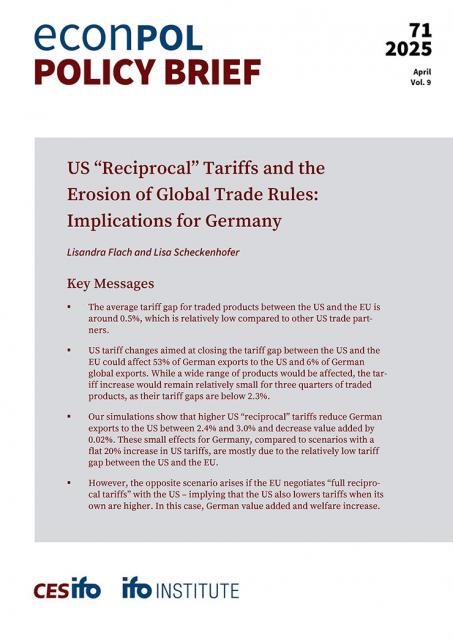If you would like to receive the latest press releases from EconPol Europe, email info@econpol.eu
Press releases
Trade Expert Flach in Favor of Free Trade Agreement between EU and Mercosur
ifo trade expert Lisandra Flach recommends quickly concluding the free trade agreement between the EU and Mercosur in Latin America. “Ratification of the agreement is key for both Europe and Mercosur to broaden their supply chains and reduce dependence on China,” Flach says ahead of the EU-Latin America summit. China is now Mercosur’s most important trading partner, she adds, while the EU has become a great deal less important in recent years.
EU Debt and Fiscal Rules No Obstacle to Public Investment
Debt and fiscal rules do not generally lead to countries investing less. This has been shown by an evaluation conducted by researchers at the ifo Institute for EconPol Europe. The European Commission is currently planning to soften the rules of the Stability and Growth Pact. According to the Commission, these rules have a negative impact on government investment. “But our findings show that fiscal rules, such as the EU’s Maastricht criteria, are not a fundamental barrier to public investment,” says Florian Dorn, coauthor of the study.
En France, l’État social compense entre 38 et 73 % des pertes de revenus en période de crise économique
En cas de hausse importante du chômage, l’État social en France rattrape les baisses de revenus globales des demandeurs d'emploi dans une fourchette de 38 à 73 %. En Belgique, c’est entre 52 et 73 %, au Luxembourg entre 43 et 52 %. C’est ce qui ressort d’une étude d’EconPol sur les systèmes de protection sociale des pays membres de l’Union Européenne. « Les systèmes de prévoyance scandinaves et d’Europe de l’Ouest offrent la meilleure protection contre les conséquences financières du chômage.
Deutscher Sozialstaat federt mehr als die Hälfte an Einkommensverlusten in Wirtschaftskrisen ab
In Deutschland federt der Sozialstaat im Falle eines starken Anstiegs der Arbeitslosigkeit zwischen 53 und 63 Prozent aller Einkommensverluste ab. Das geht aus einer EconPol-Studie hervor, die soziale Sicherungssysteme in der EU untersucht. „Die Sozialsysteme in Skandinavien und Westeuropa puffern Einkommensverluste ihrer Bürgerinnen und Bürger besonders umfassend ab.
British Welfare State Cushions About 36 Percent of Income Losses in Economic Crises
In the event of a sharp rise in unemployment in the United Kingdom, the welfare state cushions between 36 and 37 percent of all income losses. This is the result of an EconPol study that examines social security systems in the EU. “The social security systems in Scandinavia and Western Europe buffer their citizens’ income losses most comprehensively.
